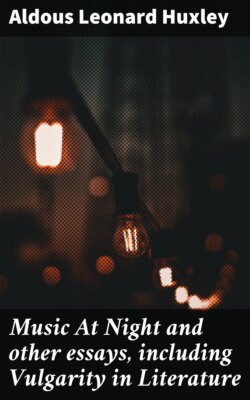Читать книгу Music At Night and other essays, including Vulgarity in Literature - Aldous Leonard Huxley - Страница 5
На сайте Литреса книга снята с продажи.
The Rest is Silence
ОглавлениеTable of Contents
From pure sensation to the intuition of beauty, from pleasure and pain to love and the mystical ecstasy and death—all the things that are fundamental, all the things that, to the human spirit, are most profoundly significant, can only be experienced, not expressed. The rest is always and everywhere silence.
After silence that which comes nearest to expressing the inexpressible is music. (And, significantly, silence is an integral part of all good music. Compared with Beethoven’s or Mozart’s, the ceaseless torrent of Wagner’s music is very poor in silence. Perhaps that is one of the reasons why it seems so much less significant than theirs. It ‘says’ less because it is always speaking).
In a different mode, on another plane of being, music is the equivalent of some of man’s most significant and most inexpressible experiences. By mysterious analogy it evokes in the mind of the listener, sometimes the phantom of these experiences, sometimes even the experiences themselves in their full force of life—it is a question of intensity; the phantom is dim, the reality, near and burning. Music may call up either; it is chance or providence which decides. The intermittences of the heart are subject to no known law. Another peculiarity of music is its capacity (shared to some extent by all the other arts) to evoke experiences as perfect wholes (perfect and whole, that is to say, in respect to each listener’s capacity to have any given experience), however partial, however obscurely confused may have been the originals thus recalled. We are grateful to the artist, especially the musician, for ‘saying clearly what we have felt, but never been able to express.’ Listening to expressive music, we have, not of course the artist’s original experience (which is quite beyond us, for grapes do not grow on thistles), but the best experience in its kind of which our nature is capable—a better and completer experience than in fact we ever had before listening to the music.
Music’s ability to express the inexpressible was recognized by the greatest of all verbal artists. The man who wrote Othello and The Winter’s Tale was capable of uttering in words whatever words can possibly be made to signify. And yet (I am indebted here to a very interesting essay by Mr Wilson Knight), and yet whenever something in the nature of a mystical emotion or intuition had to be communicated, Shakespeare regularly called upon music to help him to ‘put it across.’ My own infinitesimally small experience of theatrical production convinces me that, if he chose his music well, he need never have called upon it in vain.
In the last act of the play which was drawn from my novel, Point Counter Point, selections from the slow movement of the Beethoven A minor quartet take their place as an integral part of the drama. Neither the play nor the music is mine; so that I am at liberty to say that the effect of the Heilige Dankgesang, when actually played during the performance, was to my mind, at least, prodigious.
‘Had we but world enough and time ...’ But those are precisely the things that the theatre cannot give us. From the abbreviated play it was necessary to omit almost all the implied or specified ‘counter’ which, in the novel, tempered, or at least was intended to temper, the harshness of the ‘points.’ The play, as a whole, was curiously hard and brutal. Bursting suddenly into this world of almost unmitigated harshness, the Heilige Dankgesang seemed like the manifestation of something supernatural. It was as though a god had really and visibly descended, awful and yet reassuring, mysteriously wrapped in the peace that passes all understanding, divinely beautiful.
My novel might have been the Book of Job, and its adapter, Mr Campbell Dixon, the author of Macbeth; but whatever our capacities, whatever pains we might have taken, we should have found it absolutely impossible to express by means of words or dramatic action what those three or four minutes of violin playing made somehow so luminously manifest to any sensitive listener.
When the inexpressible had to be expressed, Shakespeare laid down his pen and called for music. And if the music should also fail? Well, there was always silence to fall back on. For always, always and everywhere, the rest is silence.
